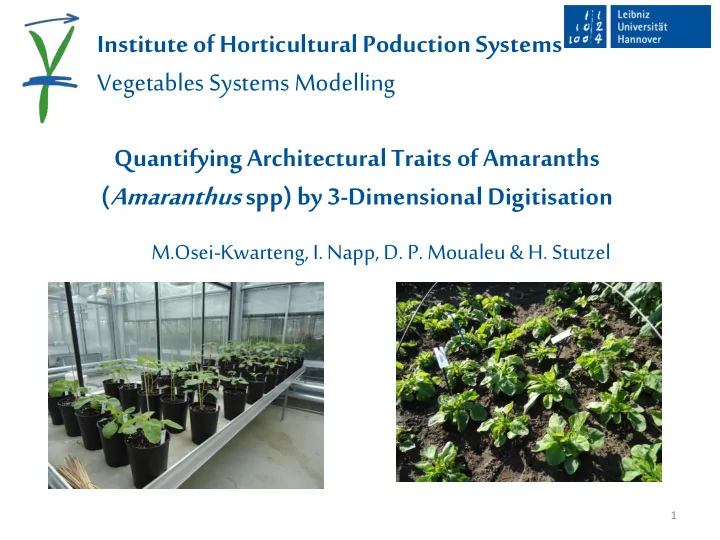

Institute of Horticultural Poduction Systems Vegetables Systems Modelling Quantifying Architectural Traits of Amaranths ( Amaranthus spp) by 3-Dimensional Digitisation M.Osei-Kwarteng, I. Napp, D. P. Moualeu & H. Stutzel 1
A.cruentus : Ex Zim – Vegetable 2
A.hypochondriacus : TSM -102 (Grain ) 3
A.tricolor : Arkasuguna (Vegetable – Asian) 4
A. dubius (Mombo 2) 5
Management Environmental practices and factors Growth processes Productivity Structure/Architecture Function (Physiological process) 6
A.cruentus A.dubius A.hypochondriacus A.tricolor 7
8
Objective: Quantify architectural traits in four Amaranthus spp and relate them to their dry matter yield Architectural traits : leaf size (length and width) , leaf shape, leaf orientation angles ( inclination and azimuth) and internode length. 9
Materials and Methods • Grown under non limiting nutrient and water conditions • Spacing: 30 cm x 30 cm isometric • Duration: May-June 2015 on the field • Location: Institute of Horticultural Production Systems, Hannover (52 ° 2 ’ N) Germany • Experimental design: Randomized complete block (RCBD) • Statistical analysis: Analysis of variance procedure (SAS,2003) 10
Materials and Methods Digitising: Plants were digitised acropetally in a standardized sequence • Leaves were digitised with 9 points • A node was the point of attachment of a leaf petiole on the stem • Internode was the interval between two nodes • Four plants were digitised per genotype Electronic unit Transmitter Receiver/pointer Digitising plants 3-D Fastrak magnetic digitiser 11
Preliminary results A.tricolor . Mean : 49.2o. S.D : 16.4o A.dubius. Mean : 42.2o. S.D. : 8.2o A.hypochondriacus . Mean : 51.4o . S.D. : 10.4o A.cruentus. Mean : 43.8o. S.D. : 10.4o 0.5 0.4 Proportion of leaves 0.3 0.2 0.1 0.0 10-20 20-30 30-40 40-50 50-60 60-70 Leaf inclination angle (degrees) 12
Preliminary results 70 a SEM : 5.67 60 b 50 Leaf area (cm 2 ) 40 c cd cd 30 cd cd cd d cd d d 20 d d d de de 10 e de de de de de e 0 1 2 3 4 5 6 Acropetal leaf rank 13
Preliminary results 70 a SEM : 5.67 60 b 50 Leaf area (cm 2 ) 40 c cd cd 30 cd cd cd d cd d d 20 d d d de de 10 e de de de de de e 0 1 2 3 4 5 6 Acropetal leaf rank 14
12 SEM : 0.55 a 10 a a Petiole length (cm) 8 bab ab b ab b 6 b cb cb c c c c c 4 c c cd d cd d d 2 0 1 2 3 4 5 6 15 Acropetal leaf rank
Conclusion • Young plants of A. tricolor have leaves equally distributed from being fairly horizontal to vertical in orientation. • Young plants of A tricolor and A cruentus exhibit low leaf areas across existing leaf positions with A. tricolor displaying low petiole length. • The fifth acropetal leaves of A. hypochondriacus have large leaf area and longer petioles than the other genotypes • Significant interaction effects exist between leaf position and some leaf dimensions 16
Outlook • Analyse other architectural traits and construct a 3D static model plant from digitised data • Relate the angular distribution and projected leaf area of genotypes to light interception • Relate differences in architectural traits to dry matter yield 17
Thank You For Your Attention !!!! 18
Recommend
More recommend